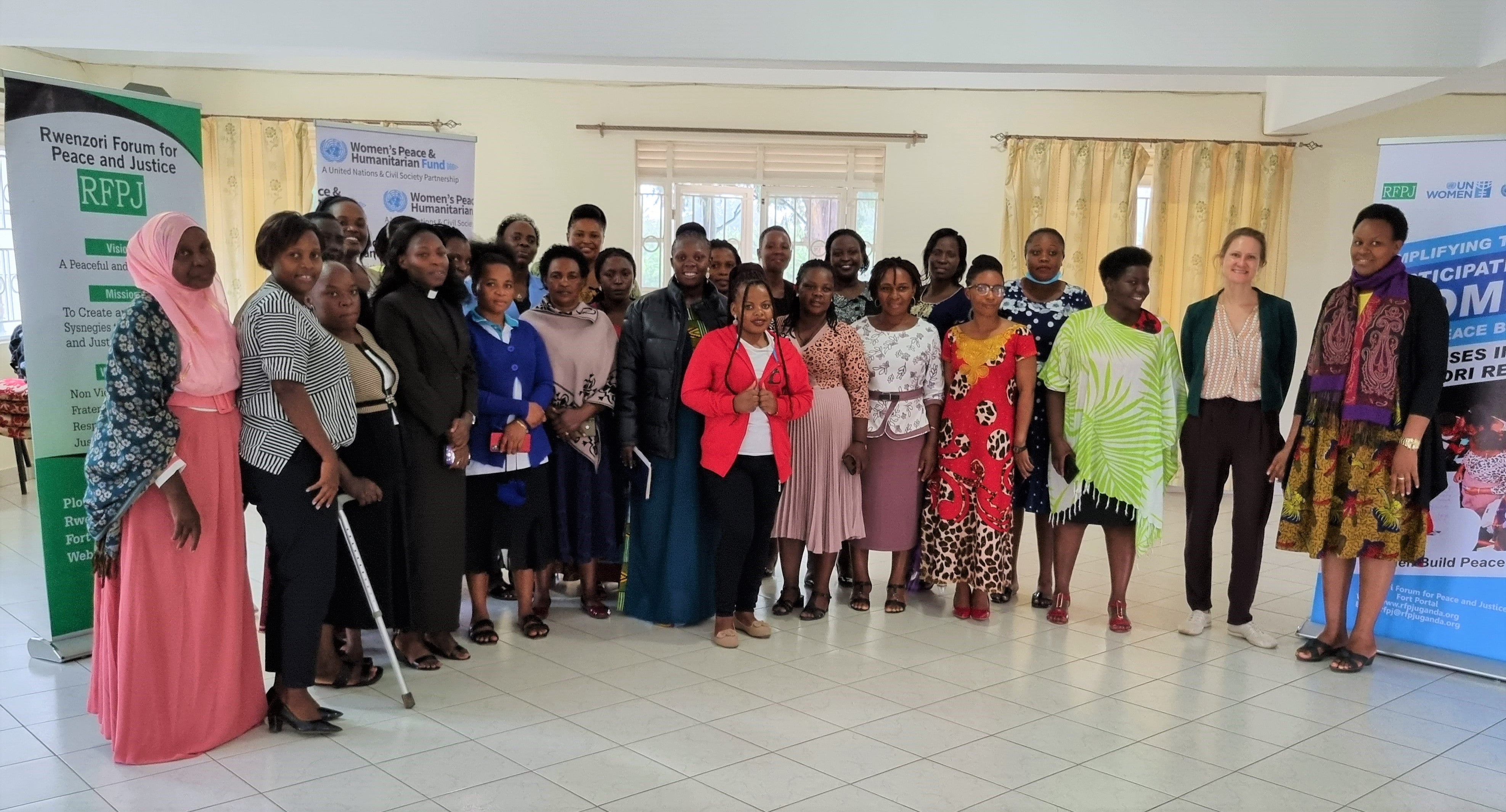
International Day of Peace 2022: Ugandans say end racism, build peace

The Women Peace and Humanitarian Fund (WPHF) grantee, Rwenzori Forum for Peace, and Justice (RFPJ) brought together religious leaders, cultural and political leaders, women and youth peace activists, and the media to commemorate the annual International Day of Peace on the 21st of September 2022 in Fort Portal City, Kabarole District in the Rwenzori Region, Uganda.
The Rwenzori region is known to be ethnically plural, and ethnicity has often been used to perpetuate conflicts and violence and such conflicts render the continuous emergence of conflicts inevitable.
In past and current conflicts in the region, there has been no proof that different ethnicities in the region antagonize each other. Instead, there have been pointers to positive historical and contemporary inter-ethnic bonds.
With technical support from the UN Women, RFPJ has provided spaces for stakeholders including - representatives of cultural institutions, security agencies, district local governments, and political parties to interface and build consensus around emerging peace-building issues, further strengthening the capacities of women as agents of peace and nonviolence to mediate, negotiate and refer emerging conflicts in Rwenzori regions.
With support from the Women Peace and Humanitarian Fund (WPHF) Programme, RFPJ has further embraced gender-inclusive peace-building strategies, such as - Promoting participation and representation of women in peace-building processes across the region. “I have not the slightest doubt that “Peace is not something you wish for, it is something you make, something you are, something you do, and something you give away”- said Mr. Steven Kiyingi, the Prime Minister of Tooro during the celebrations.
Peacebuilding is anchored on the threats to peace and by extension in the country. These include conflicts among ethnic groups leverage; fragilities along the porous Uganda border characterized by persistent criminal and rebel activities orchestrated by transnational actors and leading to the influx of refugees into Uganda; radicalization of the youth and incidents of violent extremism; failed transitional justice processes.
“I Forgive others, not because they deserve forgiveness, but because I deserve my peace, that’s why I stopped being violent in my own home, and to date, I preach peace,” said Annet one of the Peace activists trained by RFPJ.
In a bid to promote respect for Human rights and gender Equality, RFPJ works with and through organized trained communities and related structures to promote peace in the region.
“I have become part of RFPJ’s change story as I was trained as a peace activist and I contribute to the promotion of peace in my village through mediations, referrals and seen many people reconciling in Bufunjo Sub-County, Kyenjonjo,” said one of the trained Peace Activist
The celebrations closed off with a plenary as participants who also double as stakeholders highlighted key challenging impediments of justice. They decried the lack of accountability for grave human rights violations against citizens and the high level of impunity by perpetrators of violence/conflicts.
In the Rwenzori region, victims cited what many commonly referred to “Kasese Massacre” 2016 intervention of the Rwenzururu that led to the death of over 100 people and no one has come out to account for the palace, women were left as widows with children to care of.
One participant further affirmed that the above are some of the things that some people may not want to hear but without it, the true meaning of justice cannot be realized. It was mentioned that the formal justice system takes so long, and the approach seems to discourage most victims in communities which hinders peaceful co-existence.
Participants made recommendations to address some of the challenges such as building consensus on national reconciliation processes in Uganda, there is a need to formulate a committee to spearhead national reconciliation and peace-building activities within Uganda with a focus on the Rwenzori region. Furthermore, to pursue a national process of truth-seeking aimed at establishing the truth behind the past violence, especially in the region.
They further recommended that since the country has not satisfactorily invested in victim-centered post-conflict nation building. memory and memorialization initiatives ought to be prioritized, where a suggested committee can institute a National Day of Memory to commemorate victims of Uganda’s violent past